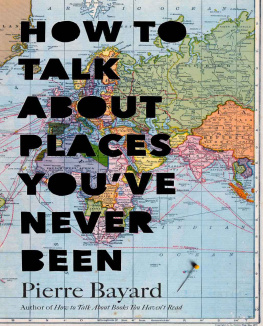
A History of Nebraska by Clinton York. The author was a gentleman about forty-seven who said he had never been to Nebraska but he had always been interested in the state.
Ever since I was a child its been Nebraska for me. Other kids listened to the radio or raved on about their bicycles. I read everything I could find on Nebraska. I dont know what got me started on the thing. But, any way, this is the most complete history ever written about Nebraska.
The book was in seven volumes and he had them in a shopping bag when he came into the library.
R ICHARD B RAUTIGAN , The Abortion:
An Historical Romance 1966
Contents
op. cit. | opere citato, in the work cited |
ibid. | ibidem, in the same place |
UP | unknown place |
VP | visited place |
DP | discussed place |
FP | forgotten place |
++ | very positive review |
+ | positive review |
negative review |
very negative review |
The inconveniences of travel have been sufficiently enough studied for me to not linger on the subject. Ill-equipped to defend itself against wild animals, inclement weather or illness, the human body is clearly not made for leaving its usual habitat and even less so for traveling to lands far removed from those where God intended us to live.
To these natural elements over which the human being has little control, we must add the unpleasantness man causes with his own ill conduct. Contrary to the dreams of certain utopians, the world is no safer now than it was in the past and, being fortunate enough to live in a relatively sheltered place, I have difficulty understanding the reasons that might lead me to leave it and risk facing hard knocks on hostile soil.
But the dangers of travel do not stop here. By focusing too much on the physical inconveniences, you lose sight of the psychological disturbances it can cause. We know from Freud and the works of other psychiatrists who have studied the various travelers syndromes that traveling a long way from home is not only liable to provoke psychiatric problems, it can also drive you mad.
All of these inconveniences would not be sufficient to keep me at home if there were not an extra considerationin my eyes, the deciding factor. It can be found at the heart of this book. There is actually nothing to show that traveling is the best way to discover a town or a country you do not know. Everything points to the contraryand the experience of numerous writers supports thisif you want to be able to talk about a place, the best thing to do is stay at home.

It is necessary to be very specific and dispel any ambiguity up front. If this book joins a long line of books denouncing the harmful effects of travel, it is not because it shares the sentiment of numerous authors that, all places being equal, there is no need to go to the trouble of leaving home and discovering any of them.
This theory was popularized by a well-known poem by Baudelaire, The Voyagewhich includes the line Bitter is the knowledge gained in travelingand in which the poet develops the theory that visiting foreign countries only leads to boredom and, once the journey is over, leaves the traveler confronted with the terrifying void of his own personality.
My own thoughts are radically different. Contrary to Baudelaire, whose ideas are imbued with some kind of Eurocentrism and in any case fail to demonstrate any great intellectual curiosity, I have found all of the countries and the cultures I have ever had the opportunity to encounter greatly enriching, and I have never regretted making the effort to interest myself in them.
Therefore, the question is not what we can gain from a knowledge of foreign placesacquaintance with which can only be beneficial to anyone with an open mindit is to know whether this acquaintance should take place directly or whether it isnt wiser to practice it through means other than physical travel.

This book is therefore dedicated to an essayistic figure I will refer to as the armchair traveler. Unlike Baudelaire, this individual does not believe that all cultures lead us back to ourselves. Both unconcerned with taking risks and wanting to keep a safe distance from the object of his research, he is capable of separating physical travel from mental displacement and takes care to limit his movements as much as possible.
Primarily concerned here are autobiographical writers who have described in minute detail places they have never visited, something that has not prevented them from issuing protracted diatribes on their subjects and rendering themthanks to the power of their writingmore present than those described by writers who considered traveling to them essential.
But writers are not the only ones this book will cover. For various reasons, such as a fear of danger or the feeling that a trip wouldnt be worthwhile, a whole series of essayists, by trade or in passinganthropologists, journalists, athleteshave been compelled at certain moments in their lives to describe places they have never seen.
Apart from these specific cases, we will see that, more frequently than one might expect, there are situations in daily lifefrom adultery to theft to murderwhen the practice of lying about the place you were at a particular moment can turn out to be of great utility, or even prove crucial to your safety or survival.

Aside from offering practical advice, this book, if it engages in a reflection on armchair travel and ways of behaving in society when forced to talk about places we have never visited, also aims to reflect on the relationship between literature and the world it portrays and, in particular, the places it hosts.
The fact that writers and many essayists, when placed in situations where they find themselves compelled to create fictions, manage to render unknown places realistically and give them a plausible form of existence effectively poses the question: what kind of space is posited in literature and how is it accommodated in language?
In order to reflect on this particular relationship between literature and space, the act of description, to which writers have frequent recourse in their daily practice, is key, because it provides a privileged observation post for studying the singularities of the fictional space that literature invents and the significant differences between it and the real world.
Beyond this matter of the literary space or topos, these discursive fictions open up the question of truth in literature. Concurrent with scientific truth about places borne out by geography, there is a different kind of truth about the world that is revealed by armchair travelersone that doesnt imply physical travel and whose operating instructions this book will endeavor to identify.

A logical structure emerges from these general considerations. In the first part of the book, I will review the different types of nonjourneys that a whole succession of writers and thinkers, unconcerned with moving away from their home turf, have employed in order to encounter the foreign cultures they wish to know and describe.
Next page













